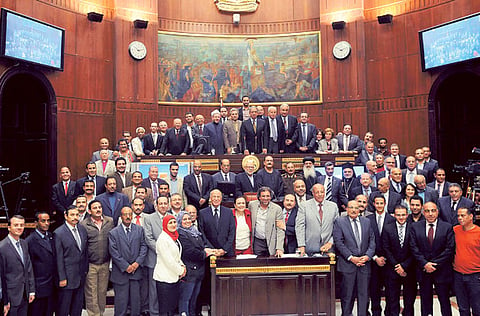Egypt draft charter puts Islamist parties in limbo
If ban is enforced, these parties will most likely turn to underground activism, expert says

Cairo: Egypt’s Islamist parties face an uncertain future as a draft constitution bans creation of political parties on religious grounds, according to experts.
“These parties, having a wide following and a broad grassroots base, face the prospect of disbanding in view of the new constitution,” said Mustafa Al Syed, a political science professor.
“In case this ban is enforced, these parties will most likely turn to underground activism, thus creating parallels to mainstream politics in the country. Failure to integrate them into the democratic course can force them into violence too.”
There are 18 Islamist parties in Egypt, with the Muslim Brotherhood’s Freedom and Justice Party and the Salafist Al Nour Party taking the lead. Both parties gained nearly two-thirds of seats in the parliamentary elections held in Egypt in late 2011, the first polls since a popular uprising forced president Hosni Mubarak out of power in February of that year.
In July 2012, Mohammad Mursi of the Brotherhood became Egypt’s first democratically elected president. Exactly a year later, the army toppled him after enormous street protests against his rule.
The military-installed authorities have since arrested thousands of Islamists mainly for allegedly inciting violence against opponents.
“In my view, rather than dissolving the existing religious parties, it would be more realistic to oblige them to comply with international standards that emphasize human rights and political pluralism,” said Al Syed. “This commitment is enough to prevent promoting hatred or discrimination along religious, ideological or ethnic lines.”
A mostly secular commission Sunday approved the draft constitution, which will be put to a public referendum before it takes effect.
If endorsed in the plebiscite expected later this month or early January, the charter will replace a controversial constitution hastily approved by an Islamist-dominated assembly last year when Mursi was in office.
“This ban does not apply to Al Nour because the party’s programme pursues political, social and economic goals, which have nothing to do with religion,” said Shaaban Abdul Aleem, a member of the ultra-conservative party.
Al Nour backed Mursi’s ouster and an ensuing roadmap that includes revising the constitution and holding parliamentary and presidential elections.
Al Nour was the only Islamist party represented in the constitution panel, appointed by caretaker President Adly Mansour. None of Al Nour members and followers has been detained in the relentless security crackdown on Islamists.
An alliance, led by the Muslim Brotherhood, has condemned the new constitution as a “black document”. “The coup plotters’ charter is invalid,” the alliance said in a statement, referring to Mursi’s overthrow. “We will restore our constitution.”
Sources inside the coalition said the grouping has yet to decide whether to call for boycotting the vote on the proposed constitution or rejecting it in the referendum.
In September, an Egyptian court outlawed the Brotherhood and ordered its assets frozen. A panel, advising the Supreme Administrative Court, recommended last month, the Brotherhood’s Freedom and Justice be dissolved. The court is to hear the case next February.
Sign up for the Daily Briefing
Get the latest news and updates straight to your inbox

